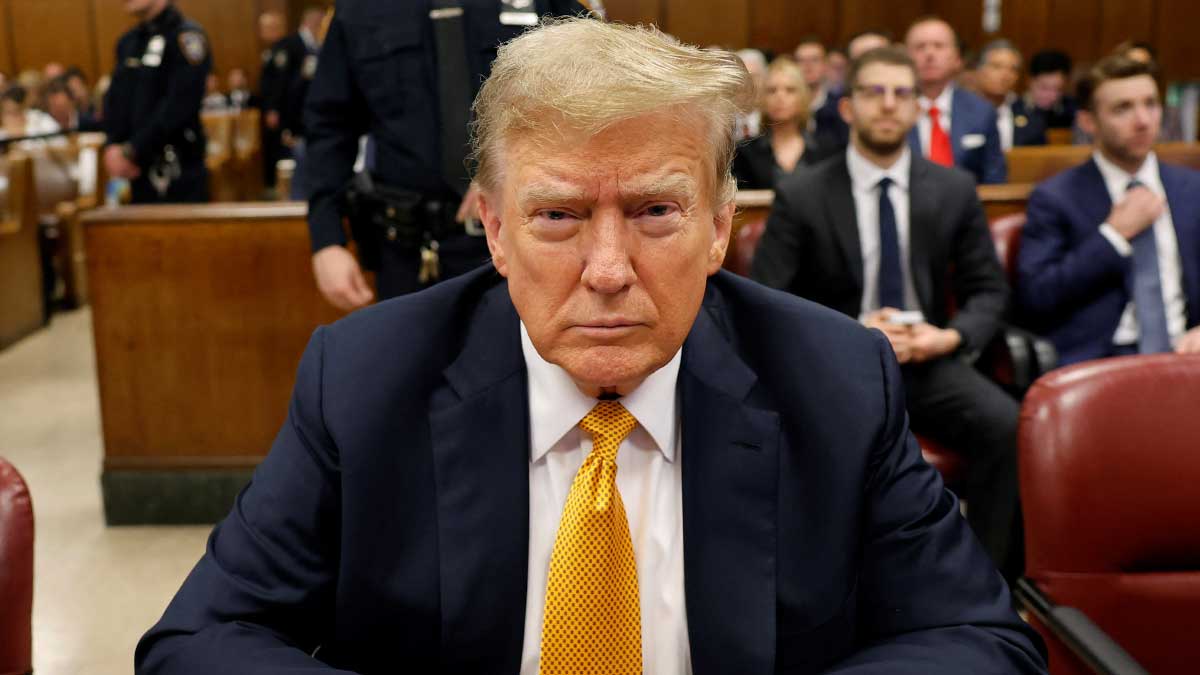- Home
- Billionaires
- Investing Newsletters
- 193CC 1000
- Article Layout 2
- Article Layout 3
- Article Layout 4
- Article Layout 5
- Article Layout 6
- Article Layout 7
- Article Layout 8
- Article Layout 9
- Article Layout 10
- Article Layout 11
- Article Layout 12
- Article Layout 13
- Article Layout 14
- Article Sidebar
- Post Format
- pages
- Archive Layouts
- Post Gallery
- Post Video Background
- Post Review
- Sponsored Post
- Leadership
- Business
- Money
- Small Business
- Innovation
- Shop
Recent Posts
How the 2024 Election Could Shape Trump’s Legal Fate

The legal cases involving former President Donald Trump are poised to take on new significance as the 2024 presidential election approaches, with outcomes that hinge heavily on whether Trump wins or loses. This week, Special Counsel Jack Smith is expected to file new court documents that will shape the trajectory of Trump’s two federal criminal cases, which have already generated widespread public and legal debate. As these filings emerge, they will offer insight into how Trump’s legal battles might evolve in the months leading up to and following the election.
If Trump loses the 2024 election, his legal cases will likely proceed without significant interference. The federal case accusing Trump of attempting to overturn the 2020 election would move forward, potentially reaching trial sometime after the election. Additionally, an appeals court will decide whether to reinstate charges in Trump’s second federal case, which alleges that he mishandled classified documents during his time in the White House. These charges had been dismissed by a district court judge appointed by Trump, but the case could be revived depending on the appeals court’s decision.
Moreover, Trump’s legal issues in state courts would also continue to advance. In Manhattan, his sentencing in a criminal case could proceed without delay, and any resulting punishment could be enforced. Meanwhile, the case in Georgia, where Trump is accused of trying to overturn the 2020 election results, would also move toward trial. However, the trial in Georgia could not begin until at least next year, as an appeals court must first determine whether District Attorney Fani Willis should be disqualified from the case—a decision that will not be made until December.
On the other hand, if Trump wins the 2024 election, the dynamics of his legal cases would shift dramatically. A victory would likely result in the dismissal or delay of his federal criminal cases. Trump is expected to appoint Department of Justice officials who are loyal to him and who could drop the federal charges related to the election case and halt the appeal in the documents case. His control over the DOJ would effectively end these federal legal challenges, though his state court cases would persist.
Despite his potential influence over federal cases, a Trump victory would not nullify his conviction in New York state court for falsifying business records. However, carrying out any sentence, such as imprisonment or travel restrictions, would be highly improbable during his presidency due to the logistical challenges involved. Trump’s legal team has already indicated plans to delay the Georgia case if he is reelected, arguing that it would be impractical for him to appear in court daily while serving as president. It remains uncertain whether these efforts would succeed.
This week, prosecutors will push for both of Trump’s federal criminal cases to progress, regardless of the uncertainty surrounding the election outcome. Smith is set to file an appeal in the federal documents case, contesting U.S. District Judge Aileen Cannon’s dismissal of the charges. Cannon, who was appointed by Trump, ruled that Smith was unlawfully appointed, a decision that has been widely criticized by legal experts. Smith’s filing may also suggest whether the government will seek to have Cannon removed from the case if the charges are reinstated. Additionally, on Friday, Smith and Trump’s attorneys will outline how they want the federal election case to proceed now that the Supreme Court has limited the charges Trump can face. A ruling on whether to postpone Trump’s sentencing in the Manhattan case is also anticipated soon. Trump has requested that the sentencing, currently scheduled for September 18, be delayed until after the election.
The possibility of Trump being sentenced to prison before the election raises significant questions. While legal experts believe it is unlikely that Trump would receive prison time as a first-time offender, it is not impossible. If he were sentenced to prison before the election or his inauguration, he could technically still serve as president, even if incarcerated. However, the logistical complexities of imprisoning a sitting president would likely result in any prison sentence being postponed until after he leaves office. Trump might also challenge his imprisonment in court, arguing that it interferes with his presidential duties.
Trump has made it clear that he intends to fire Special Counsel Jack Smith if he is reelected, which would be necessary for a Trump-controlled DOJ to dismiss the federal charges against him. Although Trump does not have the direct authority to fire Smith, as special counsels can only be dismissed by the attorney general, it is expected that any attorney general appointed by Trump would be willing to do so. Federal rules stipulate that special counsels can only be fired for specific reasons, such as misconduct or conflict of interest, but Smith could potentially challenge his dismissal in court. The outcome of such a challenge is uncertain, particularly given the current composition of the Supreme Court, which leans conservative. Cannon’s earlier ruling that Smith was unlawfully appointed could further support a DOJ argument for his removal.
Another legal question that remains unresolved is whether Trump could pardon himself if convicted in a federal case. Although presidents cannot pardon state charges, such as those in Trump’s New York case, it is still unclear whether a president can issue a self-pardon for federal crimes. The Department of Justice previously stated in a 1974 memo that presidents cannot pardon themselves, but this has never been legally tested. If Trump were to attempt a self-pardon, it would likely lead to a Supreme Court ruling on the matter.
The Supreme Court’s recent ruling on presidential immunity could also affect Trump’s legal cases. The Court decided that Trump and other former presidents cannot be criminally charged for actions taken as part of their official duties, but they can be prosecuted for acts outside of that scope. Trump is attempting to use this ruling to challenge his conviction in Manhattan and may also invoke it in his federal election and Georgia cases if the charges against him are revived. The extent to which this ruling will influence these cases is yet to be determined.
Recent Posts
Categories
- 193cc Digital Assets2
- 5G1
- Aerospace & Defense48
- AI37
- Arts3
- Banking & Insurance11
- Big Data3
- Billionaires507
- Boats & Planes1
- Business331
- Careers13
- Cars & Bikes76
- CEO Network1
- CFO Network17
- CHRO Network1
- CIO Network1
- Cloud10
- CMO Network18
- Commercial Real Estate7
- Consultant1
- Consumer Tech184
- CxO1
- Cybersecurity69
- Dining1
- Diversity, Equity & Inclusion4
- Education7
- Energy8
- Enterprise Tech29
- Events11
- Fintech1
- Food & Drink2
- Franchises1
- Freelance1
- Future Of Work2
- Games145
- GIG1
- Healthcare79
- Hollywood & Entertainment195
- Houses1
- Innovation43
- Investing2
- Investing Newsletters4
- Leadership65
- Lifestyle11
- Manufacturing1
- Markets20
- Media194
- Mobile phone1
- Money13
- Personal Finance2
- Policy568
- Real Estate1
- Research6
- Retail1
- Retirement1
- Small Business1
- SportsMoney40
- Style & Beauty1
- Success Income1
- Taxes2
- Travel10
- Uncategorized9
- Vices1
- Watches & Jewelry2
- world's billionaires476
Related Articles
H-1B Visa Debate Splits Trump Allies and Silicon Valley
The debate over H-1B visas has once again become a contentious issue,...
By 193cc Agency CouncilDecember 28, 2024Trump Moves $4B Stake in Truth Social Parent, Stock Drops 6%
Donald Trump recently transferred his 57% stake in Trump Media & Technology...
By 193cc Agency CouncilDecember 20, 2024House Rejects Trump-Backed Funding Bill, Shutdown Looms
The U.S. House of Representatives rejected a new government funding bill on...
By 193cc Agency CouncilDecember 20, 2024Trump Named Time’s Person of the Year for Second Time
On Thursday, Time magazine honored Donald Trump as its “Person of the...
By 193cc Agency CouncilDecember 12, 2024















Leave a comment